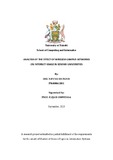| dc.description.abstract | Campus wireless network deployment at Kenyan Universities has become common
aiming at increasing internet coverage on campuses. The utilization of internet and
IT enabled services is increasingly on campuses with the pace of automation of
processes. Use of IT enabled services and the need to impress ICT in teaching,
learning and research globally has pushed Universities in adopting technology to
disseminate this core mandate.
This study investigated how growth in deployment of wireless campus network and
security level implemented affects internet usage in Kenyan Universities.
Data was collected from 14 Universities out of a total of 68 representing 21% of all
Universities. Stratified random sampling and purposeful sampling were adopted to
come up with the sample size. The respondents were ICT Managers, network
administrators, students, finance officers and researchers.
The major findings of this study indicate annual increase of internet usage that
ranges from 41% to 142% with wireless campus network deployments. For
universities where wireless networks are not deployed, growth in internet usage
ranges from 0-20%. Universities with more restrictive the security level implemented
attracts high number of users seeking support from IT team to access wireless networks and therefore limits internet usage on campus.
Based on the research findings, the study recommends the following;
1. Universities management should consider ICT as a strategic platform for
transforming teaching, learning and improving efficiency and therefore increase
IT budgets for deployment of wireless campus network infrastructure to increase
coverage on campuses to at least KES10M and above for start up universities
2. University ICT team should consider to register wireless devices in order to have
visibility of user devices to track cyber security cases since 55% of the universities
do not register wireless devices.
3. ICT user training should be carried out to finance officers and all other IS users
departments.
4. The frequency regulatory body -Communication Commission of Kenya (CCK) to
develop a roadmap on identification and allocation of frequency for the
deployment of new wireless technologies such as Long Term Evolution (LTE)
technology to rapidly expand growth of campus wireless networks or hotspots
Although wireless technology is broadly deployed on campuses, there are
challenges with ICT budget allocation for roll out of these networks and IT enabled
services by University management. There are also challenges between use of ICT
services on wireless network and security of the information systems. Internet usage
within the University community depends on the extend of coverage of wireless
networks on campuses and availability of relevant IT enabled services as well as
security level implemented on wireless networks. A balance needs to be reached
between ease of access and security level to be implemented. The study extended
knowledge by establishing practical % growth in internet usage with respect to the
various dependent variables. | en_US |

